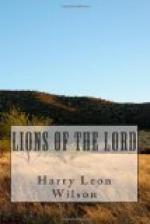Brigham, who had warmly seconded Joel Rae’s opening discourse, was now, not unnaturally, the leader of the reformation, and in his preaching to the Saints while Joel Rae lay sick he committed no faults of vagueness. For profane swearing he rebuked his people: “You Elders in Israel will go to the canons for wood, get a little brush-whipped, and then curse and swear—damn and curse your oxen and swear by Him who created you. You rip and curse as bad as any pirates ever did!”
For the sin of cattle-stealing he denounced them. A fence high enough to keep out cattle-thieves, he told them, must be high enough to keep out the Devil.
Sometimes his grievance would have a personal basis, as when he told them: “I have gone to work and made roads to the canon for wood; and I have cut wood down and piled it up, and then I have not got it. I wonder if any of you can say as much about the wood I have left there. I could tell stories of Elders that found and took my wood that should make professional thieves blush. And again I have proof to show that Bishops have taken thousands of pounds of wheat in tithing which they have never reported to the general tithing-office,—proof that they stole the wheat to let their friends speculate upon.”
Under this very pointed denunciation many of the flock complained bitterly. But Brigham only increased the flow of his wrath upon them. “You need,” said he, “to have it rain pitchforks, tines downward, from this pulpit, Sunday after Sunday.”
Still there were rebellious Saints to object, and, as Brigham drew the lines of his wrath tighter, these became more prominent in the community. When they voiced their discontent, they angered the priesthood. But when they indicated their purpose to leave the valley, as many soon did, they gave alarm. An exodus must be prevented at any cost, and so the priesthood let it be known that migrations from the valley would be considered as nothing less than apostasy. In Brigham’s own words: “The moment a person decides to leave this people, he is cut off from every object that is desirable in time or eternity. Every possession and object of affection will be taken from those who forsake the truth, and their identity will eventually cease.”
But, as the reform wave swept on, it became apparent that these words had been considered merely figurative by many who were about to seek homes outside the valley. From every side news came privately that this family or that was preparing to leave.
And so it came about that the first Sunday Joel Rae was able to walk to the tabernacle, still weak and wasted and trembling, he heard a sermon from Brigham which made him question his own soul in an agony of terror. For, on this day, was boldly preached, for the first time in Zion, something which had never before been more than whispered among the highest elect,—the doctrine of blood-atonement—of human sacrifice.




